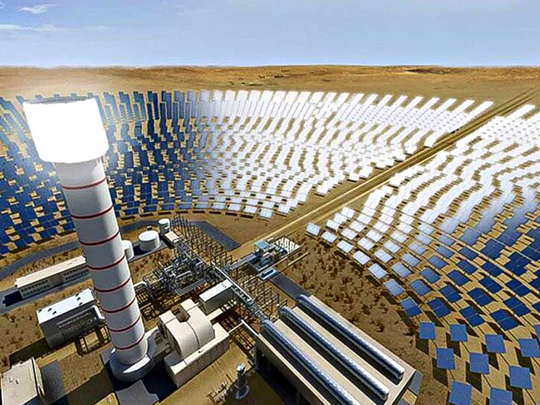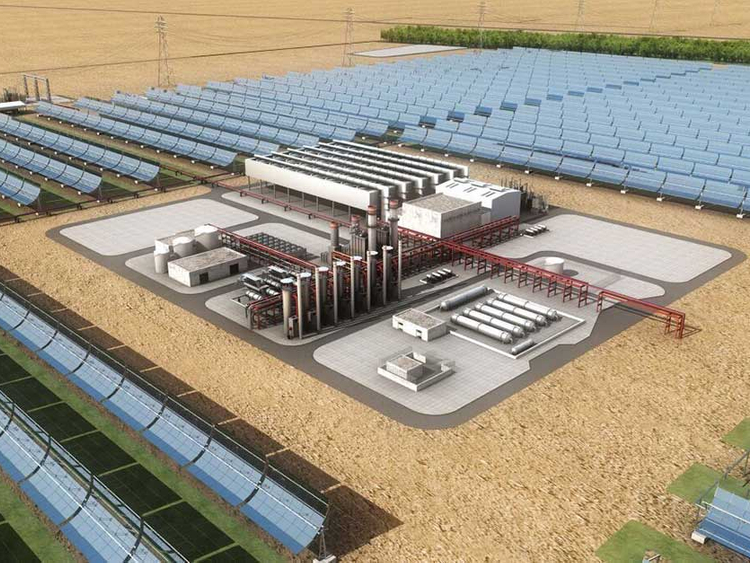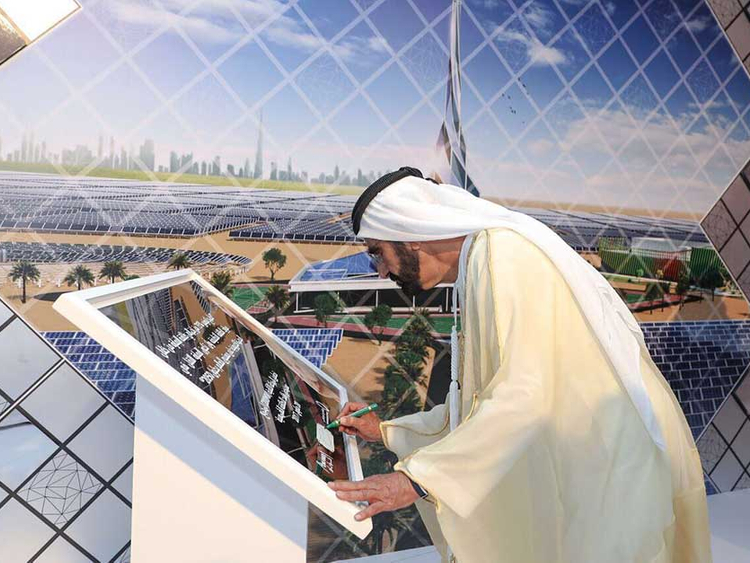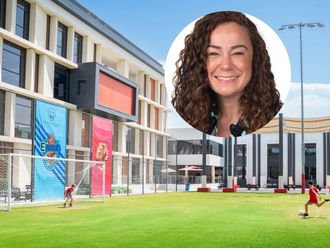
Dubai: The world’s largest Concentrated Solar Power (CSP) project, costing Dh14.2 billion, will be implemented in Dubai, state news agency Wam reported on Saturday.
To be implemented by Dubai Water and Electricity Authority (Dewa), the largest single-site project will generate 700 megawatts (MW) of power when completed. Using the Independent Power Producer (IPP) model, it will include the world’s tallest solar tower, standing 260 metres tall, and a Dh100 billion fund to finance the plan.
His Highness Shaikh Mohammad Bin Rashid Al Maktoum, Vice-President and Prime Minister of the UAE and Ruler of Dubai, launched the project on Saturday.
A total of Dh500 million will be allocated, as part of the project, for research and development works in in the field of smart networks and improvement of energy efficiency over the course of the coming period.
World’s largest Concentrated Solar Power (CSP) project at Mohammed bin Rashid Al Maktoum Solar Park to generate 700MW of clean energy pic.twitter.com/YTeUqrAKJN
— Dubai Media Office (@DXBMediaOffice) September 16, 2017
The project comes as part of implementing the fourth stage of the Mohammad Bin Rashid Al Maktoum Solar Park and to support the end goals of Dubai Clean Energy Strategy 2050.
Commenting on the project, Shaikh Mohammad said: “The UAE has succeeded in building a global green economy model based on the environmental sustainability and clean energy and supported by clear plans. These plans will contribute to strengthening the foundations of such model and developing it according to the world’s finest standards so as to make the most of this field and invest in enhancing infrastructure, building capabilities and training competent national competencies.”
He added: “Implementing the world’s largest concentrated solar power (CSP) project reaffirms the UAE’s leadership in renewable clean energy all over the world and enhances our status at the forefront of the most advanced countries in this field. We are pressing ahead with carrying out projects that support the UAE’s comprehensive development and our aspirations that we have set for the future and are being implemented today.
“We are steadily moving towards achieving Dubai Clean Energy Strategy 2050 goals, which we have launched to turn Dubai into a global hub for clean energy and green economy and become the lowest carbon footprint in the world by 2050. We are very proud to see our goals turning into tangible achievements by our national cadres who proved efficient and excellence in various fields.”
Dewa has revealed that it has awarded the contract for the construction of the CSP project using the Independent Power Producer (IPP) model with a consortium that includes Saudi Arabia’s ACWA Power and China Shanghai Electric. It has also guaranteed to achieve the lowest cost price of energy with 7.3 US cents per kilowatt.
Dewa is also working to sign an energy purchase agreement and putting in place all necessary arrangements for the CSP project, which will be implemented in the last quarter of 2020.
Saeed Mohammad Al Tayer, managing director and CEO of DEWA, said: “Awarding this strategic projects comes in line with Shaikh Mohammad’s vision aiming to boosting the sustainability and turning Dubai into a global hub for clean energy and green economy through Dubai Clean Energy Strategy 2050, which aims to provide seven per cent of Dubai’s power through clean energy by 2020, 25 per cent by 2030 and 75 per cent by 2050.”
The Mohammad Bin Rashid Al Maktoum Solar Park is the largest single-site strategic renewable energy project, using the IPP model. It will generate 1,000MW by 2020 and 5,000MW by 2030.
Dubai Clean Energy Strategy 2050 consists of five main pillars: infrastructure, legislation, funding, building capacities and skills, and having an environment-friendly energy mix.
The infrastructure pillar includes initiatives such as Mohammad Bin Rashid Al Maktoum Solar Park, which is the largest generator of solar energy in the world from a single location, with a capacity to produce 5,000MW by 2030, and total investment of Dh50 billion. The first phase of this project began operations in 2013. The second phase will begin operations in April 2017 with a capacity of 800MW, the third phase will begin operations in 2020 with a capacity of 1,000 MW, while the fourth phase will begin operations in 2030 with a capacity of 5,000MW, which is 25 per cent of the total energy production in the emirate of Dubai, as estimated.
The infrastructure pillar also includes a comprehensive innovation centre, which will be built using 3D printing technology. The innovation centre features a group of research and development centres specialised in the next generation of clean energy technologies such as solar energy, technology test centre, drones research centre, 3D printing technology, and solar energy based desalination test centre. Dh500 million will be invested in research and development in areas such as integration of smart grids, energy efficiency and electricity generation from solar energy.
The infrastructure pillar also includes the establishment of a new free zone under the name of Dubai Green Zone that is dedicated to attracting research and development centres and emerging companies in the field of clean energy.
The second pillar of legislation focuses on the establishment of a legislative structure supporting clean energy policies in two phases. The first phase will be implemented through Shams Dubai initiative, which aims to encourage building owners to place solar panels on the roofs and link them to the main network of Dewa. The second phase includes coordination with Dubai Municipality to issue a set of decisions on the integration of consumption rationalisation technology and energy production and the requirement to install solar panels on the roofs of all buildings in Dubai by 2030.
The third pillar is related to financing solutions for investment in research and development on clean energy and its application. This pillar includes the establishment of a Dubai Green Fund worth Dh100 billion, which will contribute, through its financial resources, easy loans for investors in the clean energy sector in the emirate at reduced interest rates. Dewa will ensure the demand management and economic value of the project.
The fourth pillar aims to build human resources capabilities through global training programmes in the field of clean energy in cooperation with international organisations and institutes such as International Renewable Energy Agency (IRENA), as well as international companies and research and development centres. The pillar will contribute to the creation of a sustainable model for research and development in the area of clean energy based on specialised human capabilities in this field.
The fifth pillar is focused on creating an environment friendly energy mix comprising of solar energy at 25 per cent, nuclear power at seven per cent, clean coal at seven per cent, and gas at 61 per cent by 2030. The mix will gradually increase the employment of clean energy sources to 75 per cent by 2050, making Dubai the city with the least carbon footprint city in the world. This pillar also activates energy generation mechanisms through waste by employing state-of-the-art technologies in this area that will contribute to turn 80 per cent of the emirate’s waste to energy by 2030.
Project at a glance
Dubai is building the world’s most ambitious Concentrated Solar Power (CSP) project
It will cost Dh14.2 billion to build and deliver 700 megawatts (MW) of power
The independent, single-site project , include the world’s tallest solar tower, standing 260 metres tall, and a Dh100 billion fund to finance the plan
Dubai Electricity and Water Authority (Dewa) will implement the project; it has awarded the contract for the construction of the project to a consortium that includes Saudi Arabia’s ACWA Power and China’s Harbin Electric.
Dewa says the project will achieve the lowest cost price of energy, at 7.3 US cents (around 26 fils) per kilowatt.














